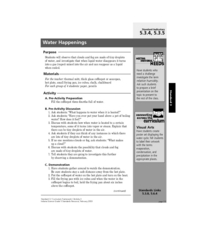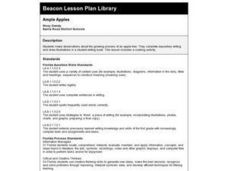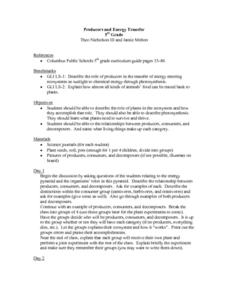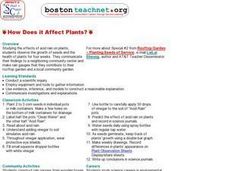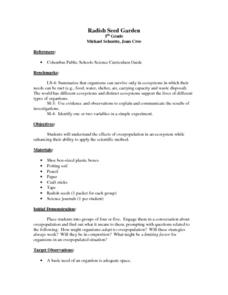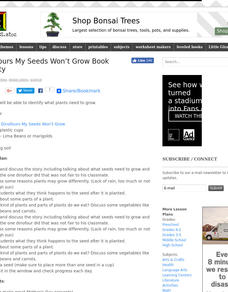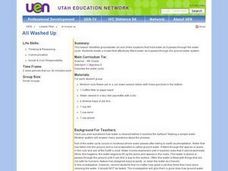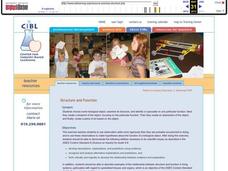Curated OER
Erosion
Fifth graders study what erosion is, what causes it, and ways to slow its progress. They complete an experiment that depicts soil moving down a slope as water is poured on it to show how moving water erodes land. Next, they observe...
Curated OER
Water Happenings
Fifth graders observe how water changes phase through a teacher-led demo. In this earth science instructional activity, 5th graders relate the demo to the water cycle. They draw and label each stage of the cycle.
Curated OER
Salad Party
Pupils bring different plant parts in order to make one big salad. They observe each part and classify it.
Curated OER
Culture Everywhere
Students study their culture while filling in a chart that shows how culture meets basic human needs. They examine the role of archaeologists in studying people from past cultures.
Curated OER
Ample Apples
First graders read stories and make observations about the life cycle of an apple tree. They write and illustrate expository text about apple trees and make applesauce.
Curated OER
Erosion and Deposition
Fifth graders study the processes of erosion, transportation, and deposition in soil. They walk outside the school to see examples and then accurately create a physical model which shows each type of soil movement and allows them to...
Curated OER
Structure and Function of Seeds
Students study the functions of seeds. In this biology lesson plan, students observe the structure of a seed as they show the function of the cotyledons in providing nourishment to the plant during the early times after germination.
Curated OER
Discovering Pi
Students investigate the math concept of Pi (specifically, what pi is, the significance and how it is used in the real world). This is a hands on lesson plan in which the students actively participate with their investigations.
The...
Curated OER
Producers and Energy Transfer
Fifth graders discuss the relationship between producers, consumers, and decomposers as they look at the energy pyramid. While working in small groups, they create an ecosystem that includes all or some of the given categories, and they...
Curated OER
To Light or Not to Light
Pupils examine the role of light and dark in a living environment. In this photosynthesis lesson, students hypothesize about the best environment for plant growth, record observations using plant seeds in various light and dark...
Curated OER
Erosion Explosion
Ninth graders explore soil erosion. Through a class discussion, they examine soil conservation methods. Given a potted plant, 9th graders observe the effects of erosion when water is poured over the soil. Students brainstorm terms...
Curated OER
Growing Plants with Worm Castings
Students test worm castings for content and use them to grow seeds. They hypothesize which castings best sustain seed growth. They observe growing plants to test their hypotheses. Later they graph their data.
Curated OER
How Does it Affect Plants?
Students examine the effects of acid rain on plants. They observe the growth of seeds and the health of different plants for a month. They share their findings with the community.
Curated OER
Learning from Artifacts Uncovering Clues, Large and Small
Learners observe artifacts from Fort St. Louis at a website in order to make inferences about the people who lived there. They paint pottery in the style which might have been used by one of the cultural groups who inhabited the fort.
Curated OER
Erosion
Fifth graders study the effects of running water on erosion. They examine how the soil on the playground is affected by erosion and determine how the placement of trees and shrubs changes the path of erosion. In their science journals,...
Curated OER
Planting the Seed
Learners plant their seeds and collect and organize their own materials for planting. They also set up their planters with wicks, fertilizer, potting mix, and seeds. Finally, students write their names on planter markers with a ball...
Curated OER
Let it Grow and See What Happens
Students participate in an experiment in which they try to stop algae from growing. In groups, they develop a hypothesis and test it while making changes to the experiment along the way. They make observations and organize their data...
Curated OER
Radish Seed Garden
Fifth graders explore the effects of overpopulation in an ecosystem while applying the scientific method. They discuss overpopulation and its meaning. Students as an organism competes for space in an overpopulated area. They plant...
Curated OER
North Carolina Pottery
Students examine the process of evaporation. They observe how when clay dries, the water evaporates and how the weight of the object decreases. They complete a worksheet to complete the lesson.
Curated OER
What's Under There?
Students determine ways to make "observations" about unknowns, such as the land beneath an ice sheet or the interior of the Earth, using tools other than sight. They build "mystery boxes" and exchange them with other groups to "map"...
Curated OER
Dinofours My Seeds Won't Grow
Students listen to a read aloud, Dinofours My Seeds Won't Grow. They talk about what plants need to grow and study the parts of plants. They discuss what types of plants we eat after which they plant a seed in order to observe the growth...
Curated OER
All Washed Up
Fourth graders simulate filtration of water containing contaminates to determine how nature cleans water. They make predictions, report observations, and construct reasonable explanations concerning their outcomes. then connect this to...
Curated OER
Structure and Function
Structure and Function
SynopsisStudents choose some biological object, examine its structure, and identify or speculate on one particular function. Next they create a blueprint of the object, focusing on the particular function. Then...
Curated OER
The Circulatory System--Part III
Students research the process for the preparation of a soup. Students explore the safety issues of food preparation. Students, after presenting their soups to the class, will eat their soups that they have prepared.



